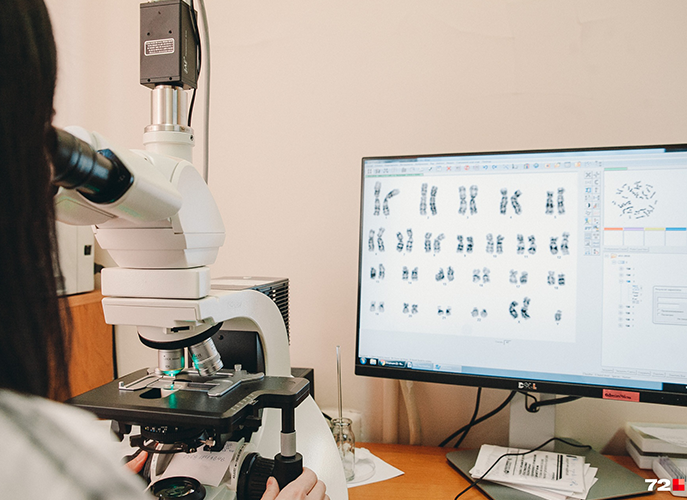Molecular Cytogenetics:
Cytogenetic testing can be conducted on different types of bodily tissues, both during prenatal and postnatal stages.
These techniques can identify various numerical or structural chromosome abnormalities that may result in genetic disorders. These tests are available for use in prenatal, postnatal, and even on aborted specimens.

High-Resolution Karyotyping
Blood Karyotyping
In humans, the typical cell contains 23 pairs of chromosomes, totalling 46. Each set of 23 is inherited from one parent, with 22 pairs called autosomes, shared by both males and females. The 23rd pair, known as sex chromosomes, differs between males (one X and one Y) and females (two X chromosomes).
Karyotyping is the process of studying and identifying these chromosomes, aiming to detect significant chromosomal changes such as balanced rearrangements or variations in the number of copies of chromosomes. Balanced rearrangements can exist in healthy individuals without apparent abnormalities, but they can lead to unbalanced rearrangements in their offspring, resulting in various genetic disorders. Extra or missing copies of chromosomes can also cause structural abnormalities.
Blood karyotyping is a valuable diagnostic tool that can identify and diagnose individuals with these chromosomal variations. Identifying balanced chromosomal rearrangements in parents can help assess the risk of miscarriages in each pregnancy.
In children with intellectual disabilities and distinctive physical features, blood karyotyping is used to determine the underlying cause and assist in prognosis and management. It also aids in determining the origin of genetic variations and the recurrence risk for subsequent siblings.
Blood Karyotyping can help identify the cause in
- Couples experiencing repeated pregnancy losses
- Children exhibiting distinctive facial features
- Children born with congenital heart abnormalities
- Children facing intellectual disabilities and/or delays in global development
Sample type: Sodium heparin tube
TAT: 7-8 working days
Fluorescent In Situ Hybridization (FISH)
The FISH technique offers superior resolution when compared to karyotyping. It can identify both numerical and minor structural alterations in the aforementioned tissues, aiding in the confirmation or identification of known genetic issues.
Prior discussion with the laboratory is crucial before utilising FISH. Currently, FISH is primarily available for detecting fetal aneuploidies, microdeletion syndromes, and is commonly used in the field of oncology, particularly in haematological malignancies.
| Test Code | Test | SAMPLE | CONTAINER TYPE | TAT |
|---|---|---|---|---|
| F012 | Del(20q) [MDS] | Bone marrow / Peripheral blood | Sodium heparin Vacutainer (2ml) | 5-6 days |
| F013 | Del(5q) [MDS] | Bone marrow / Peripheral blood | Sodium heparin Vacutainer (2ml) | 5-6 days |
| F014 | Del(7q) [MDS] | Bone marrow / Peripheral blood | Sodium heparin Vacutainer (2ml) | 5-6 days |
| F016 | 17p(p53) | Bone marrow / Peripheral blood | Sodium heparin Vacutainer (2ml) | 5-6 days |
| F017 | 11q(ATM) | Bone marrow / Peripheral blood | Sodium heparin Vacutainer (2ml) | 5-6 days |
| F018 | Prader-Willi Syndrome | Peripheral blood | Sodium heparin Vacutainer (2ml) | 5-6 days |
| F019 | William's Syndrome | Peripheral blood | Sodium heparin Vacutainer (2ml) | 5-6 days |
| F020 | Di-George Syndrome | Peripheral blood | Sodium heparin Vacutainer (2ml) | 5-6 days |
| F021 | CHROMOSOMES [13, 18, 21, X & Y] | Amniotic fluid | Sterile container (20ml) | 5-6 days |
| Chorionic villi | Sterile Container | |||
| Blood | Heparin vacutainer (2ml) | |||
| F022 | Single Chromosome FISH | Amniotic fluid | Sterile container (20ml) | 5-6 days |
| (13/18/21/X/Y) | Chorionic villi | Sterile Container | ||
| Blood | Heparin vacutainer (2ml) |
Male Fertility Tests
Male Fertility Tests are significant as they account for approximately 40-50% of overall infertility cases.
Chromosomal abnormalities, whether involving numerical or structural changes, can significantly impact fertility. Such abnormalities can be present in males experiencing infertility.
This test is designed to detect chromosomal aneuploidies, Y chromosome deletions, and sperm aneuploidies. The results of these tests offer valuable insights into any cytogenetic alterations that may be contributing to male infertility.
| Test Code | Test | SAMPLE | CONTAINER TYPE | TAT |
|---|---|---|---|---|
| MI001 | Y Chromosome Micro-deletion | Peripheral blood | EDTA vacutainer (2ml) | 4-5days |
| MI002 | Sperm DNA fragmentation | Semen Sample | Sterile Container | 4-5days |
Chromosomal Microarray Testing
Chromosomal Microarray Testing provides comprehensive screening for deletions, duplications, and loss of heterozygosity across all chromosomes.
These microarrays serve a wide range of applications, from POC (Products of Conception) analysis to being the primary choice for testing in cases of Developmental Delay, Multiple Congenital Anomalies, Mental Retardation, and Autism Spectrum Disorders.
The availability of various microarray chips depends on the number of probes, and more information can be found on our Chromosomal Microarray page.

